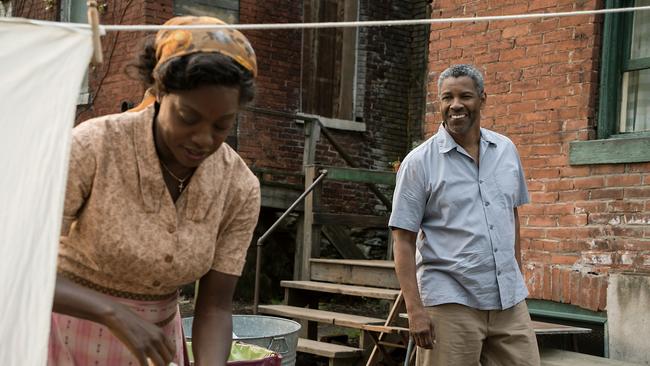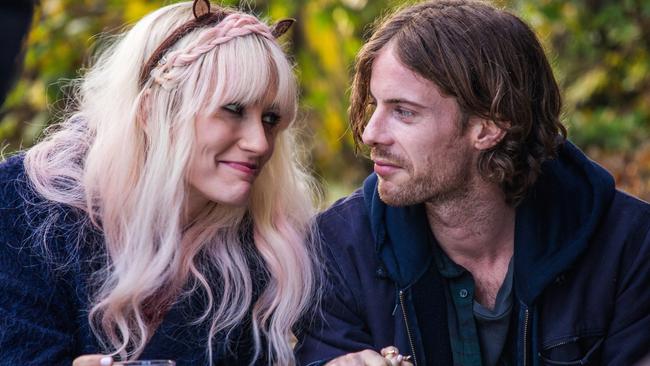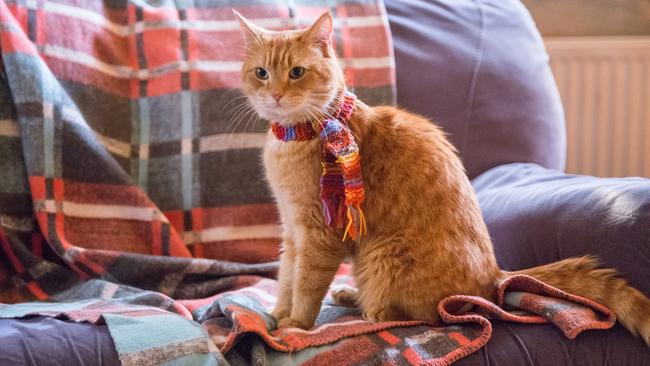Reviewed: Fences with Denzel Washington; A Street Cat Named Bob
The question of how to adapt plays for the screen has been around since movies began.

The other day I was rewatching Ray Lawrence’s magnificent film Lantana (2001), which was based on a play, Speaking in Tongues by Andrew Bovell, who adapted his own work for the screenplay. I’m convinced that if you were unaware that the origins of the film were to be found in the theatre you’d be amazed to learn of its source, thanks to the skill and cinematic flair with which Lawrence and Bovell transformed the material from one medium to another.
The question of how to adapt plays for the screen has been around since movies began. Films based on Shakespeare have regularly been opened out by their adaptors and filmed on location wherever possible, with the recent Justin Kurzel adaptation of Macbeth a good example. But some filmmakers have made minimal attempts to visualise theatrical material, and Denzel Washington’s adaptation of August Wilson’s Tony and Pulitzer prize-winning play Fences is just the latest example of this. Hardly any attempt has been made to rethink the play in terms of cinema, so the drama is almost entirely set in the home and the backyard of Troy Maxson (Washington) and his wife Rose (Viola Davis) in suburban Pittsburgh in the 1950s. Only fleetingly do we glimpse the world outside the Maxsons’ house; the play’s three acts are marked by fades to black; key characters are discussed but never seen in what seems like a very theatrical concept; and you can practically see the proscenium arch.
These days we’re seeing more and more filmed plays and operas in our niche cinemas, “events” in which cameras placed in the theatre have captured an actual performance of some distinction. These are by no stretch of the imagination “films” (which is why they’re not reviewed on this page) but they allow audiences the world over a chance to experience theatrical productions they would otherwise have to travel long distances to see. Fences isn’t in that category; it is a film, but one that’s most likely to appeal to audiences who enjoy the kind of filmed theatre described above.
The play was first staged in America in 1985, to considerable acclaim; Washington and Davis won Tonys for their performances in the 2010 Broadway revival, so they are no strangers to the material.
Troy works as a garbage collector — the film’s opening sequence, showing him and his buddy Bobo (Stephen McKinley Henderson) at work on the city streets, is one of just a couple of location scenes. But this is soon followed by a lengthy sequence that unfolds on a sound stage depicting the back yard of the Maxson house, and the main themes are introduced by a series of theatrical monologues delivered as Troy and Bobo consume a bottle of gin. Troy reveals his bitterness — a proud and, by nature, a conservative man, he blames racism for his thwarted youthful opportunities. He also makes clear the status he demands in being “boss” over his wife and teenage son, Cory (Jovan Adepo). Yet he’s unable to see that Cory, whose dream of playing football is frustrated by his father’s insistence that he obtain a “proper” job, is just as resentful as he was at that age.
Troy also despises Lyons (Russell Hornsby), his son by a former marriage; Lyons, a jazz musician, is in his 30s but still comes to his father seeking financial assistance, and Troy pours hurtful scorn on what he sees as his son’s weakness. Also part of the family is Gabriel (Mykelti Williamson), Troy’s younger brother, whose wartime injuries have resulted in severe brain damage.
After establishing these characters at some length, Wilson — who wrote the screen adaptation before he died in 2005 — introduces a wildcard that affects everybody and alters the previously established relationships. The film’s latter stages highlight the excellence of Davis’s performance as the long-suffering wife whose values are sorely tested, though Washington also effectively depicts the mood swings that transform Troy from a charming family man into a bullying tyrant.
We’ll never know whether Fences would have worked better on screen if it had been completely reinvented for the cinema. As it is, we are able to enjoy a theatrical experience, and some really fine acting, with minimal obvious changes made to the original stage production.

There have been plenty of stories about the support and inspiration given to humans by dogs and horses, but perhaps not quite so many about how a cat changed a man’s life. A Street Cat Named Bob is the amiable true story of London busker James Bowen, whose life was transformed when a ginger cat attached himself to him. Footage of James and Bob went viral on YouTube and it’s easy to see why. A couple of books followed and now a film version of the story is being released with Luke Treadaway as James and no less than seven moggies portraying the eponymous Bob.

The story commences in 2007, when James was homeless and addicted to methadone. The root of his plight apparently lies in his abandonment as a hopeless case by his father (Anthony Head) — who has entered into a second marriage with a woman very hostile towards James. At the lowest point of his life, James is given much needed support by Val (Joanne Froggatt), a social worker, who succeeds in finding him some very basic accommodation. And then the cat arrives, walking through an open window into the flat and settling down as if he owns the place. He’s named Bob by Betty (Ruta Gedmintas), a friendly neighbour.
Soon Bob is following James on to the bus and along the streets and is contentedly sitting beside him as he begs for cash from passers-by in Covent Garden. Bob makes lots of friends and his presence results in more donations for James. Man and cat become inseparable friends.
If that were all it would be a pretty slim story, but the screenplay by Tim John and Maria Nation, based on two books by Bowen, packs in a lot more incident, including a romance with Betty. There’s conflict (a belligerent passer-by allows his dog to urinate on James’s belongings, resulting in a fight and a ban being placed on James’s busking), and a visit by James to his father on New Year’s Eve — accompanied by Bob, of course — that ends as badly as we knew it would.
Veteran director Roger Spottiswoode makes the most of this appealing yarn and has fun showing us a Bob’s-eye view of the streets of London. As you will have gathered, this is primarily a feel-good entertainment — complete with photographs of the real James and Bob at the end — but the director tries his best to keep sentimentality at bay and scenes in which James goes cold turkey, or in which his best friend dies, might prove strong meat for younger children hoping to see a jolly film about a friendly cat.
Fences (PG)
3 stars
National release
A Street Cat Named Bob (PG)
3.5 stars
National release



To join the conversation, please log in. Don't have an account? Register
Join the conversation, you are commenting as Logout